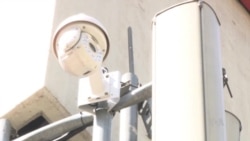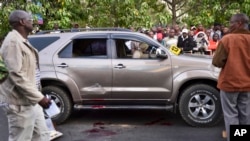Kenyan security forces will rely heavily on a system of closed-circuit cameras installed throughout Nairobi to provide security during U.S. President Barack Obama's visit this month. But so far, the camera system has not worked as well as advertised.
When George Muchai, a member of Kenya's parliament, two bodyguards and a driver were gunned down in the pre-dawn hours of February 7, newly-installed cameras in the city center where the attack occurred were expected to help police identify the killers.
That night's events were recorded by a camera on top of a nearby building, but in the shadowy video obtained by VOA, it's impossible to make out distinct figures.
Alois Lentoimaga, Vice Chair of the Parliament Security Committee, said CCTV failed to help solve the murders.
"The investigation was thorough, [but] there are other gadgets which are used, especially the phone, the telephone...Some of those fellows were nabbed because of that," he said. "It's not so much of CCTV because CCTV is not fully operational."
Since then, the government installed more cameras and security agencies will rely heavily on CCTV as part of the overall security effort during Obama’s visit.
And Nairobi County Roads Executive Mohamed Abdullahi says previous problems are being addressed.
“We expect from the ground into the control room is compromised when you have infrastructure going on that affects the connectivity,” he said.
The cameras have cost the county government $4.4 million – an expenditure welcomed by police to fight crime and ease traffic congestion.
"The cameras we are working on to put in place will be excellent in terms of performance," said Masoud Mwinyi, a police spokesman. "We do not want at any time for Kenyan citizens to feel that they have been short-changed."
But many Kenyans say they are still waiting to see the system's value for the Nairobi.






